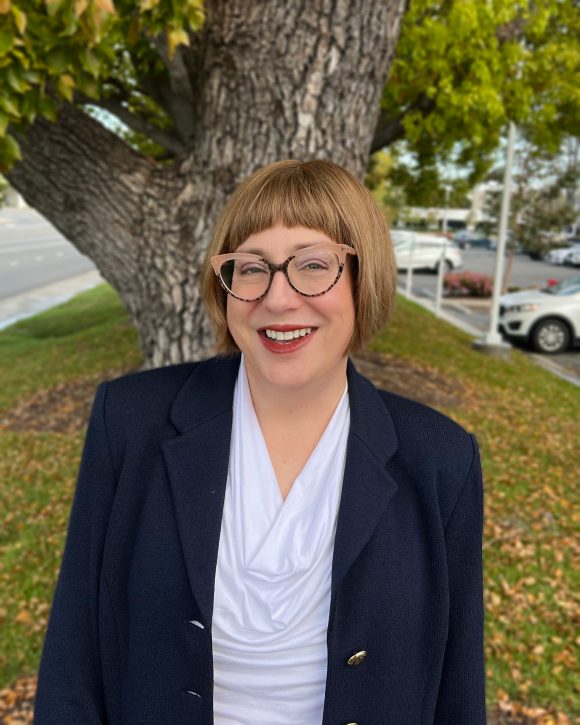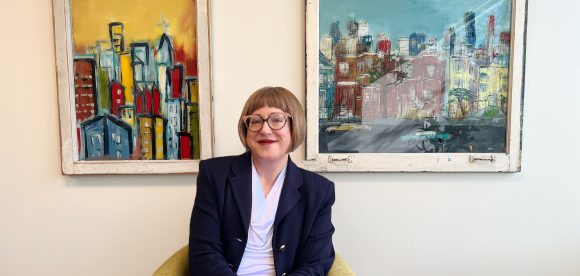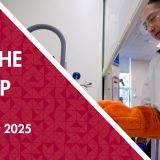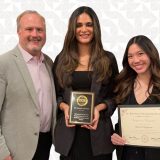Women in Leadership: Dr. Madeline Dintzner
March 28, 2023
Meet Dr. Madeline Dintzner, a trailblazing Associate Dean with over 20 years of experience in higher education. While currently serving as CUSP’s Associate Dean of Assessment and Accreditation, Dr. Dintzner has also served as chair of the Department of Chemistry at DePaul University in Chicago and as the Assistant Dean of Assessment and Accreditation at Western New England University’s College of Pharmacy and Health Sciences. Her contributions to the fields of education, chemistry, and pharmacy have been nothing short of outstanding.
Below: Dr. Madeline “Maddie” Dintnzer
 There’s something else unique about Dr. Dintzner’s experience as a woman in STEM- She is the first openly transgender woman to hold a top leadership position in a WASC-accredited pharmacy college. Although being a trans person is not the core of her identity as a woman in leadership, it has given her a unique understanding of women in STEM.
There’s something else unique about Dr. Dintzner’s experience as a woman in STEM- She is the first openly transgender woman to hold a top leadership position in a WASC-accredited pharmacy college. Although being a trans person is not the core of her identity as a woman in leadership, it has given her a unique understanding of women in STEM.
Let’s start with the basics: How did you get involved in research?
As an undergraduate chemistry major, I was naturally drawn to research as part of my education and found that I absolutely loved being in the lab. That continued through graduate school, a post-doc, and into my first 15 years or so in academia. At that point, for me, it was all about mentoring my students and ushering them into the exciting world of discovering and sharing new knowledge. More recently my career has taken me out of the lab and more into administrative leadership, which I also love, but I still engage in the scholarship of teaching, learning, and assessment.
You must be quite the scientist, given that you were awarded a six-figure grant within five years of completing your Ph.D. What was that like? Would you consider that to be your first major success professionally?
When I was hired at DePaul University in 2000, the Chemistry Department did not have a high-field NMR spectrometer, which is more or less essential for doing research in organic chemistry synthesis. So, I really had no choice but to secure the funding to purchase one. It took me three tries to do so, but yes, when funding finally came through from NSF, it was a game-changer not only for me but for others in the department, including all of our students. Interestingly, when I moved from DePaul to WNE in 2012, I faced the same situation—no NMR!—and had to do the same thing again. NSF came through a second time and we were able to purchase another 300 MHz NMR spectrometer. Fortunately, I didn’t have to do it a third time when I moved from WNE to Chapman!
Did you have a role model who is a woman who served as an inspiration or support for you?
Many! From trail-blazing figures like Amelia Earhart, Marie Curie, and Julia Child, to artists like Madonna and Taylor Swift, and transgender women like Janet Mock. On a more personal level, I’ve had many inspiring friends to whom I’ve turned over the years for guidance and support.
Those are some very impactful names you listed as role models, it’s important to acknowledge the impact of women across all fields. Why is it important for women to be in this industry?
It’s important for women to be in any industry where we have the desire, talent, passion, and skills. I don’t believe in gender boundaries when it comes to personal or professional pursuits of any kind, although I am aware that they are still perpetuated by some. I believe that humans can do remarkable things regardless of where they identify on the gender spectrum.
Do you have any other advice for women looking into the pharmaceutical industry?
Keep pushing and moving forward and upward. Many, if not most, of the most talented and successful students I have worked with over the past 20+ years have been women, and if pharmacy, or any science or health-related discipline, is your passion, give it your all and just go for it!
I love the enthusiasm! Has the culture surrounding women in the industry changed since you entered? Have you seen a rise in women in management, administration, or other leadership opportunities?
Yes and no. If we’re talking specifically about pharmacy and pharmacy education, it has evolved to where there are more women than men pursuing PharmD degrees and entering the profession, but I believe there is still a significant salary gap, and leadership positions remain, at least marginally, dominated by males. As a transgender woman, my path has been a little different than others, but that’s perhaps a conversation for another day.
Reflecting on your experiences, what would you like to see improved in the future?
I feel very strongly about promoting diversity, equity, and inclusion in all aspects of life, and would love to see that embraced more broadly in our culture.
Is there any parting advice you’d like to give? Perhaps what you would say to your 25-year-old self?
Be true to your authentic self and stop caring so much about what others think.
Above: Dr. Dintzner in her office with her two “window paintings”.


